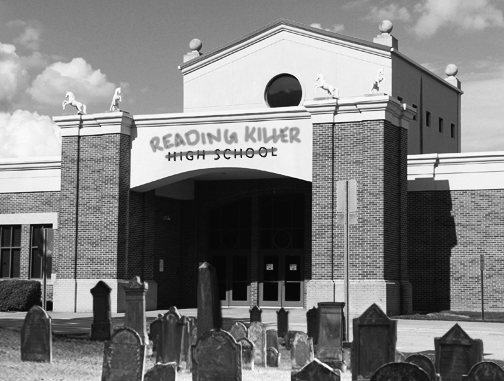
By Nydia Ramos, Editor in Chief
 There’s a proven steady decline of interest in reading as students go from elementary up to high school. Instead of it being a pleasure, it becomes a necessity. It becomes work that kids don’t want to deal with. Schools ruin reading for kids while continuing to cram book after book into our curriculum.
There’s a proven steady decline of interest in reading as students go from elementary up to high school. Instead of it being a pleasure, it becomes a necessity. It becomes work that kids don’t want to deal with. Schools ruin reading for kids while continuing to cram book after book into our curriculum.
According to a study done by the National Center for Education Statistics in 2013, reading for pleasure between the ages of 9 and 17 years old drops from 53 percent to 19 percent. Though seemingly in direct contradiction, test scores in national reading assessments always improve drastically as students grow older. The statistics show that they never stopped reading, but they did stop enjoying it.
Children start off reading with books full of color and worlds that make their imaginations run wild. Reading is enjoyable, simple, and entirely necessary to a child’s education for obvious reasons; such as developing language and critical thinking skills. But as students grow into teens, reading becomes something different. It’s forced, tested upon and monotonous at times.
After being forced to read pretentious novels that teens can’t relate to, they begin to get discouraged. Having to memorize painstaking details just to regurgitate them back onto a bubble sheet is enough to make someone want to quit reading all together. Still, schools preach Shakespeare to 15 year olds as if they’ll be able to decipher anything useful from a centuries old playwright who writes in rhyming couplets.
Students don’t read to learn anymore. They read because that’s what they’re told to do. They analyze the words with no emotions attached. It’s not personalized to them as people so they don’t connect with it. All these dystopian societies and epic poems are so detached from the everyday life of a teen. While learning about all of these things are very important, it’s approached in such a way that doesn’t resonate.
Students are told to read and memorize. How can they be expected to understand the meaning behind Macbeth when all they were doing was studying the roles of the characters just to do well on that matching portion of the test?
Ditch those multiple choice tests, multiple choice means memorization. The memorization takes away from the important parts of the books. It isn’t really about the vocabulary words, the names of the different settings in the story, or even the major plot points. It’s about what the story is trying to say. The character development and the message behind it. As long as those are the things being focused on, then the book is being put to good use, and students will become much more engaged in the novel.
Keep up the short answer questions; they stimulate critical thinking. The student will retain more information or lessons learned by pushing them to think deeply and reflect on the meaning of the stories. Push students to connect these stories back to their own lives. That’s the key to gaining their interest.
And to the students who don’t enjoy reading anymore. They need to do themselves a favor and pick up a book outside of school every once in a while. Books can do so much more than most imagine if only they read without tests and school in mind. If one can read a book and learn about others from it, then congratulations, they’re literate. But, if one can read a book and learn about themself from it, they’ve really done it right.
